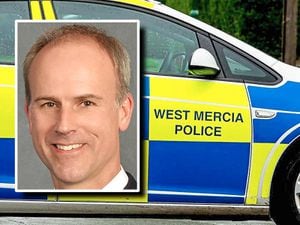Revealed: West Mercia Police to make £24.3 million cuts in three years
West Mercia Police will need to make cuts of £24.3 million over the next three years to balance its budget, according to its Chief Constable.

Anthony Bangham said the force needed to find savings of £7.9 million during the current financial year, and a further £16.4 million by April 2021 in his annual management statement.
These savings come on top of £67.4 million which has already been cut since 2012, he said.
It also comes as the West Mercia force was named bottom but one in England and Wales for the number of beat officers it has patrolling streets, with just 8.5 officers per 100,000 people.
Mr Bangham spoke as West Mercia Police revealed its ambitions for the coming years.
MORE:
The force has created a mission statement in which it sets out its priorities and reveals the main challenges it faces.
The chief constable said major savings were being sought, but that he hoped to protect frontline services.
Some of the savings will be made by replacing the outdated police station in Shrewsbury with a new centre that would be shared with other services.
Six key areas
Mr Bangham identified six priority areas for the next 12 months, including sexual exploitation and abuse of children, serious and organised crime, and organised theft and fraud.
Domestic abuse, slavery and human trafficking, and reducing the number of deaths and injuries on the roads were also highlighted
His report also revealed that there were 306 high-risk offenders across the force area who were subject to a special offender management programme.
Mr Bangham’s report reveals the pressure the force is under as it continues to make cost savings. It received 610,202 calls in 2017 – with the number of 999 emergency calls rising by 10 per cent in 12 months.
Despite the extra pressures, Mr Bangham said 90.2 per cent of 999 calls were answered within 10 seconds.
He also revealed that the force had helped train 302 hotel staff to spot the signs of sexual exploitation of children.
Mr Bangham said advances in technology would help deliver the cost savings while still maintaining standards. He said it made it easier to forecast future demands.
“The extended period of decreasing budgets has increased the pressure still further to become more efficient and effective at what we do,” he said.
“Improvements in technology give us more options than ever before to be able to prevent crime and respond quickly and effectively to incidents when they happen.
"We are predicting and adapting to change and adopting technology that supports us in protecting people from harm.”
Mr Bangham said there was a notable increase in the complexity of crime, with a growing trend towards using the internet and social media to record and track incidents.
The report said the force employed 1,981 officers and 239 community support officers.
Future focus of force
Prisoners who were jailed indefinitely to protect the public are being released in greater numbers, West Mercia’s chief constable has warned.
Anthony Bangham said in his annual report that many prisoners jailed under the Public Protection Scheme, which ran from 2005 until 2012, were now being freed, placing extra pressure on police resources.
Mr Bangham also said in his force management statement that a new team had been set up to prioritise calls. Where possible, low-level calls would be dealt with by telephone rather than deploying officers.
Here is a summary of the main points raised in Mr Bangham’s report:
1. Managing offenders
Mr Bangham said there were 306 offenders across the force area who were subject to the integrated offender management scheme, which subjected those suspected of serious offences to close supervision.
Mr Bangham says those identified as the greatest threat were managed jointly by the police and other agencies. Of the 306 offenders subject to the scheme, 146 (48 per cent) were in jail, while 160 (52 per cent) were at liberty.
Mr Bangham said the force made 2,347 visits to registered sex offenders during 2017.
He identified three key challenges in managing offenders:
The increasing complexity of digital offending, and the volume of material within these investigations;
An increase in the number of offenders who required monitoring and continuous investigation;
A reduction in the ability of other organisations to support the rehabilitation of offenders.
Mr Bangham voiced concerns that offenders who were jailed under the Imprisonment for Public Protection Scheme, which operated between 2005 and 2012, were being released in greater numbers.
“These offenders are being released in greater numbers,” said Mr Bangham. “Many of these are difficult cases, prone to self-harm and suicide, which generates increased and complex demand.”
Mr Bangham said the Ministry of Justice was also trialling a scheme where offenders were monitored electronically, as an alternative to prison, which was likely to go nationwide next year.
He said funding shortages in organisations that the police worked with was having an impact on the support available to offenders.
“In particular, challenges exist in identifying housing for offenders, a large proportion of which are released from custody to no fixed abode,” he said.
2. Finances
The force needs to save a further £24.3 million by April 2021 to bring expenditure in line with anticipated funding.
Mr Bangham said that over the six years leading up to April 2017, the force delivered savings of £52.4 million, and over the following year another £15 million worth of spending cuts were identified. “In 2018/19 further savings of £7.9 million are needed to balance the budget and a further £16.4 million by 2020/21 to bring expenditure into line with anticipated funding,” he said.
“A total of £91.7 million will have been delivered by the end of 2020/21.”
Mr Bangham said while these savings were being delivered, policing also had to be efficient and effective.
He said police and crime commissioner John Campion was planning £55 million capital investment over the next four years.
“This investment is key to reforming policing and delivering better services,” Mr Bangham added.
He says the force is committed to replacing the outdated police station in Shrewsbury with a modern base, in collaboration with other services.
3. New technology
Mr Bangham said the force would make significant investment in new technology to provide a more efficient service.
“Calls for service continue to increase yearly and the nature of the calls continues to become increasingly complex,” he said.
“We recognise the challenges that this presents, but with our significant investment in new technologies, combined with our innovative approaches to remodelling demand, we are confident we have plans in place to mitigate these changes.”
He said a new system of screening phone calls had been introduced in April this year, which seeks, where possible, to resolve matters by telephone rather than sending an officer out.
“The teams assess incoming workload and determine the most appropriate and proportionate response to incidents,” he said, adding that initial data suggested it had been able to reduce call-outs by 10 per cent.
“This will allow police officers more time to focus on incidents that pose the greatest threat, and those remaining crimes which are solvable.
“Analysis shows that the amount of police time spent on investigating low-risk inquiries and low-harm allegations is disproportionate to the number of crimes actually solved.”
He added that a new joint control centre, shared with the fire service, would improve efficiency. New technology means officers will be able to receive real-time information while on the move.
Mr Bangham said that between June and October last year body-worn video cameras were introduced across the force.
“We believe that this will have a positive impact on the number of complaints and the time taken to resolve them,” he added.
Mr Bangham forecast that the cameras would help resolve 95 per cent of complaints.
4. Rising demands
Mr Bangham said the force handled 610,202 phone calls last year, with 311,284 incidents recorded.
Both figures showed a significant year-on-year increase, with the number of incidents rising from 299,591 in 2016 and 278,100 in 2015.
“Overall incident demand is increasing two per cent annually, with emergency 999 calls increasing by 10 per cent in the last 12 months,” said Mr Bangham.
“We anticipate that calls for service will continue to increase over the next three-to-four years.”
He added that 51 per cent of calls resulted in an incident being recorded.
5. Sexual abuse and exploitation of children
Mr Bangham says child sexual exploitation has been identified as a major priority in the Telford area, and a dedicated team has been set up to respond to it.
More than 302 staff working at every hotel in Telford has received training from the force’s Harm Reduction Unit to spot signs of children who might be vulnerable to sexual exploitation.
Mr Bangham said this was now being extended to the wider night-time economy, such as pubs, wine bars and nightclubs.
“The breadth of prevention activity, proactive operations and robust investigations will continue in Telford, and has been rolled out to the rest of West Mercia to safeguard vulnerable individuals targeted in this crime,” he said.
The Children Abused Through Exploitation (Cate) team, set up as a joint venture between police and Telford & Wrekin Council in 2008, provides support to children who have been identified as being at risk.
Mr Bangham said the police and crime commissioner has also provided significant funding for counselling and psychotherapy for victims of sex abuse, and also to a centre which provides 24-hour service to anyone up to the age of 17 who has suffered from sex abuse.
6. Domestic abuse
Mr Bangham said there had been a year-on-year increase in reported domestic abuse across the force area.
This, he said, reflected a national trend which resulted from better recording practices, and more people coming forward to report these crimes.
He said the force control room, which was for many people their first contact with the police, was vital to identifying potential victims of domestic abuse.
Staff who handled calls in the centre have all received training in dealing with abuse victims, he said.
Mr Bangham said the force has identified five areas where improvements were needed:
The arrest rate for perpetrators;
The rate at which perpetrators were charged and brought to justice;
Building a case for the victim when they were reluctant to give evidence;
Making effective use of powers, such as Domestic Violence Protection Notices, which could be issued to provide temporary protection for victims, and the Domestic Violence Disclosure Scheme, commonly known as Clare’s Law, which enabled people to obtain information about whether their partner had a previous history of domestic violence;
Improvements in the recording of risks relating to domestic abuse.
Mr Bangham said the planned introduction of new legislation in this area was likely to extend the definition of domestic abuse, with new offences reflecting the impact it has on children.
“These new measures are welcomed, however we anticipate this will lead to an increase in demand,” he said.
“Over the next three-to-four years it is anticipated that levels of domestic abuse demand will begin to stabilise, as improvements in service delivery are established and prevention activity is delivered with more consistency.”





